Relationship Spread #1
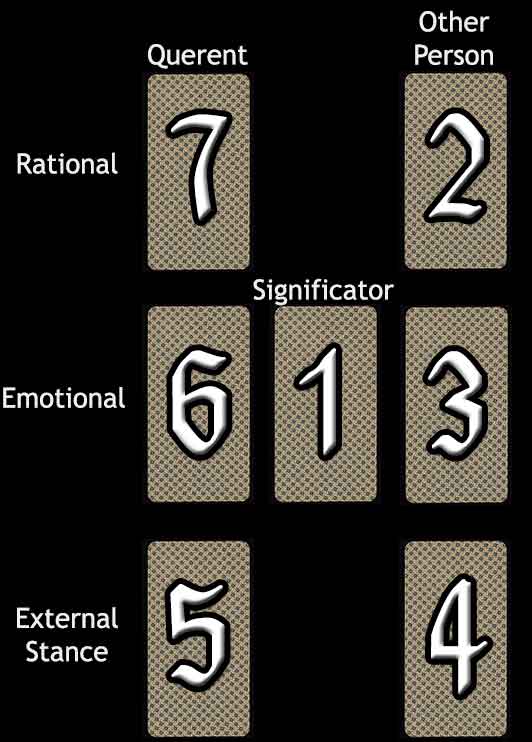
Difficulty: Easy
This tarot spread is easy to read, like a convenient chart. In this spread, court cards generally indicate actual people with the same characteristics. Knights (or corresponding princes, but not kings) and queens are meant to represent actual men and women in this tarot spread. Look for patterns in the cards as always.
Card #1 is the overall significator of the relationship. The two columns on either side of the significator characterise each individual's role in the relationship. The relationship does not have to be romantic. In fact, it could be a relationship between a person and a group, or even how two groups relate.
The top row, cards #7 & #2, is about the conscious thoughts of each person, or what they think about the relationship and likewise how they view their partner.
The middle row, cards #6 & #3, reveals the way each individual feels about the other. Emotional awareness corresponds to a person's unconscious thoughts that run deep, affecting a person in ways he or she is not fully aware of.
The bottom row, cards #5 & #4, represents the way each person behaves, in other words the stance taken regarding the relationship. The way a person acts may be genuine, but sometimes people are phony and manipulative, so it is best to weigh this card against the other person's cards to determine how they match up.
Your Relationship #1 Reading
You |
Other Person |
||
Thought |
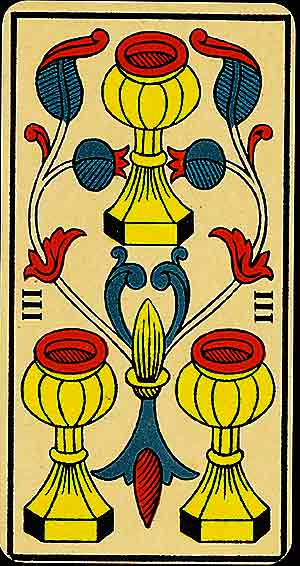 Three of Cups |
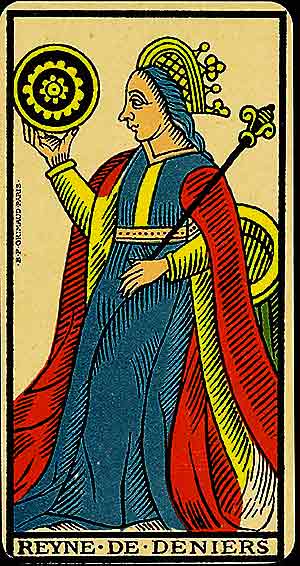 Queen of Coins |
|
Emotion |
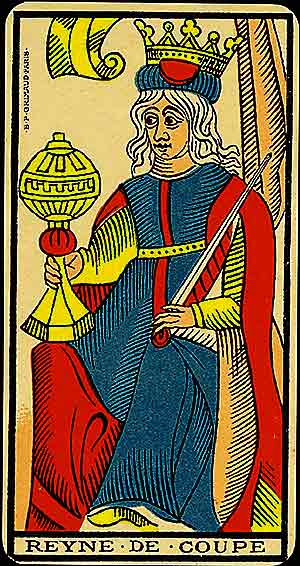 Queen of Cups |
The Significator 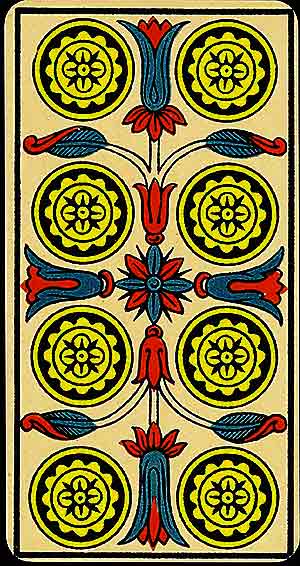 Eight of Coins |
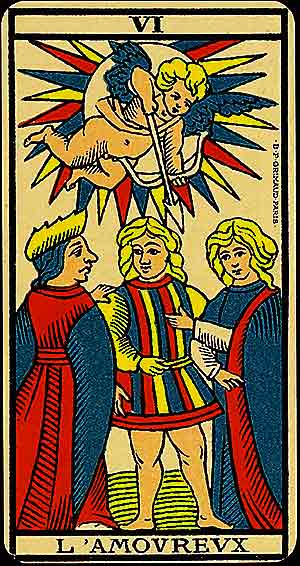 VI – The Lovers (L'Amoureux) |
External Stance |
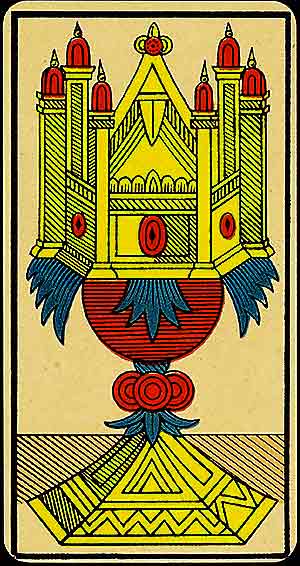 Ace of Cups |
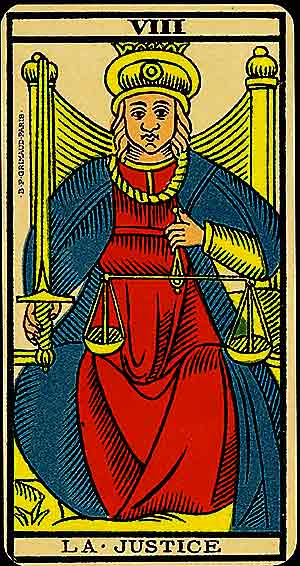 VIII – Justice |

The Significator
Eight of Coins
The Eight of Coins represents diligence, skill development, and the pursuit of mastery. It signifies focused effort and the rewards of hard work.
Symbolism: Eight coins are arranged in a methodical, balanced design, reflecting order and craftsmanship. The symmetrical details emphasise the value of precision and dedication.
In Relationships: Effort and care are required to build or maintain a strong connection. This card highlights the value of commitment.
In Work: A time for honing your skills or perfecting a craft. Focus and dedication lead to mastery and long-term success.
Spiritually: The card reflects disciplined practice in spiritual pursuits, encouraging consistent effort for growth.
When ill-dignified: Laziness, poor craftsmanship, or frustration with slow progress. It warns against neglecting effort or pursuing shortcuts.

The Querent's Thoughts
Three of Cups
The Three of Cups signifies celebration, joy, and the strength of community. It highlights the beauty of shared experiences and collective support.
Symbolism: Three cups are arranged in a triangular formation, adorned with floral embellishments. The triangular structure represents unity and the joy of collaboration, while the flourishing details reflect abundance and festivity.
In Relationships: A period of happiness and shared experiences. It may also signify joyful gatherings.
In Work: Success celebrated with colleagues or recognition of collaborative achievements.
Spiritually: The card encourages gratitude and participation in rituals or practices that foster collective growth and harmony.
When ill-dignified: Overindulgence, superficial connections, or neglecting personal boundaries. It warns against prioritising social validation over genuine connection.

The Other Person's Thoughts
Queen of Coins
The Queen of Coins embodies nurturing, abundance, and mastery of the material realm. She represents the integration of practicality and care, creating a space for growth and prosperity.
Symbolism: The Queen sits on a throne, holding a coin delicately but firmly in her fingertips, symbolising her control over material resources. Her flowing robes suggest comfort and grace, while her throne and sceptre reflect her nurturing and abundant energy.
In Relationships: A caring and supportive partner who creates a stable and nurturing environment. It encourages generosity and patience in relationships.
In Work: A time of financial stability and resourcefulness. Success comes through practical wisdom and thoughtful management.
Spiritually: The Queen invites the seeker to honour the sacred in everyday life, recognising the spiritual in material prosperity.
When ill-dignified: Overindulgence, materialism, or possessiveness. It warns against neglecting emotional or spiritual needs in pursuit of wealth.

The Querent's Emotions
Queen of Cups
The Queen of Cups embodies emotional depth, compassion, and intuitive wisdom. She represents the nurturing of emotions and the ability to comfort others.
Symbolism: Seated gracefully on her throne, the Queen holds a beautifully crafted cup, symbolising her mastery over emotions. Surrounding designs evoke her intuitive and healing energy.
In Relationships: This card signifies a loving, empathetic partner or deepening emotional bonds. It encourages open-hearted communication and mutual support.
In Work: The Queen highlights the importance of compassion and emotional intelligence. It suggests a role where empathy and intuition are vital for success.
Spiritually: The Queen reflects the mastery of your inner emotional world and the ability to channel intuition and empathy into healing and guidance.
When ill-dignified: Emotional overwhelm, dependence, or manipulation. It warns against losing yourself in emotions or using your sensitivity to control others.

The Other Person's Emotions
VI – The Lovers (L'Amoureux)
The Lovers signifies choice, connection, and the interplay between opposing forces. It represents the power of free will in aligning with one's deepest values and desires.
Symbolism: A central figure stands between two others, often interpreted as a choice between duty and desire or contrasting influences. Above, Cupid aims an arrow, symbolising divine inspiration or the fateful pull of love. The figures' expressions suggest conflict and harmony, reflecting the complexity of relationships.
In Relationships: Profound connections, romantic choices, or a pivotal decision within a partnership. It highlights emotional and spiritual harmony.
In Work: A crossroads where important decisions must align with personal values. Collaboration or partnerships may play a key role.
Spiritually: The Lovers calls for integrating dualities—earthly and divine, passion and reason—on the path to wholeness.
When ill-dignified: Indecision, temptation, or imbalance. It warns of superficial attractions or ignoring inner truth in key decisions.

The Querent's External Stance
Ace of Cups
The Ace of Cups embodies the pure essence of emotional fulfilment, love, and spiritual connection. It represents the beginning of a satisfying phase in relationships, creativity, or inner growth.
Symbolism: A single chalice sits at the centre, decorated with royal motifs. The flowing embellishments signify abundance, renewal, and the divine source of emotional nourishment. The symmetry emphasises harmony and the wholeness of new beginnings.
In Relationships: The Ace heralds the start of a new relationship or the rekindling of emotional intimacy. It speaks of deep emotional connections.
In Work: A surge of inspiration or the beginning of a project that aligns with your heart's desires.
Spiritually: The card represents a divine outpouring of love and spiritual awakening, calling the seeker to open their heart to the infinite.
When ill-dignified: Emotional blocks, insincerity, or missed opportunities for connection. It warns against repressing feelings or ignoring the heart's call.

The Other Person's External Stance
VIII – Justice
Justice signifies truth, balance, and the law of cause and effect. She represents the impartial hand of the universe, delivering outcomes that align with one's actions and intentions.
Symbolism: Seated on a throne, Justice holds scales in one hand and a sword in the other. The scales symbolise balance and fairness, while the sword represents the clarity and decisiveness required to enact justice. Her direct gaze emphasises accountability and integrity.
In Relationships: Honest communication and equitable partnerships. It calls for evaluating the fairness and balance within relationships.
In Work: Decisions made with integrity will lead to just rewards. It is a time to act ethically and weigh all options carefully.
Spiritually: Justice reflects the law of karma and encourages alignment with higher principles to achieve spiritual clarity.
When ill-dignified: Corruption, dishonesty, or imbalance. It warns against biased decisions or failure to take responsibility for your actions.